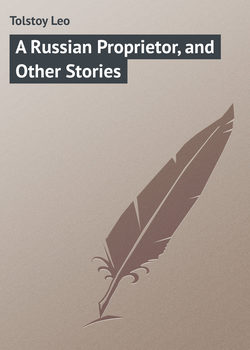Читать книгу A Russian Proprietor, and Other Stories - Лев Толстой, Лев Николаевич Толстой, Leo Tolstoy - Страница 1
PREFACE
ОглавлениеThe following tales are, with one exception, taken from the second volume of Count L. N. Tolstoï's collected works, and are representative of his literary activity between 1852 and 1859.
The first story, though only a fragment of a projected novel to be called "A Russian Proprietor," is perfect and complete in itself. One cannot help feeling that it is autobiographical; Count Tolstoï himself, it will be remembered, having suddenly quitted the University of Kazan, in spite of the entreaties of his friends, and retired to his paternal estate of Yasnaya Polyana, near Tula. The aunt whose letter is quoted in the first chapter must have been Count Tolstoï's aunt, mentioned in the second chapter of "My Confession."
The "Recollections of a Scorer" and "Two Hussars" are both evidently reminiscent of Count Tolstoï's gambling-days. Both must have been suggested by some such terrible experience as that told of the count's gambling-debt in the Caucasus.
"Lucerne" and "Albert" are likewise evidently transcripts from the author's own experience. The strange benefactor in each, and the shadowy Prince Nekhliudof, are all Count Tolstoï in phases quite distinct from what he is at present.
"The Three Deaths," written in 1859, has little of the sombre power of "Iván Ilyitch." The scalpel which was so remorselessly applied to the soul in the latter is wholly hidden. It is realism pure and simple; and the contrast between the death of the peasant and of the lady is left to inference, made all the stronger by the unexpected and grandiose finale in the death of the tree.
In interesting contrast to these characteristic stories is the little gem entitled "A Prisoner in the Caucasus," which is found in Vol. IV. of the Count's works under the heading "Tales for Children." The style is perfectly simple and lucid; the pictures of life in the Tatar village among the mountains are intensely vivid, painted with strong and masterly touches; and the reader will not soon forget the little laughing maiden Dina, with the rubles jingling in her braided hair. She stands forth as one of the most fascinating of the author's creations.
NATHAN HASKELL DOLE.
Boston, Dec. 5, 1887.
